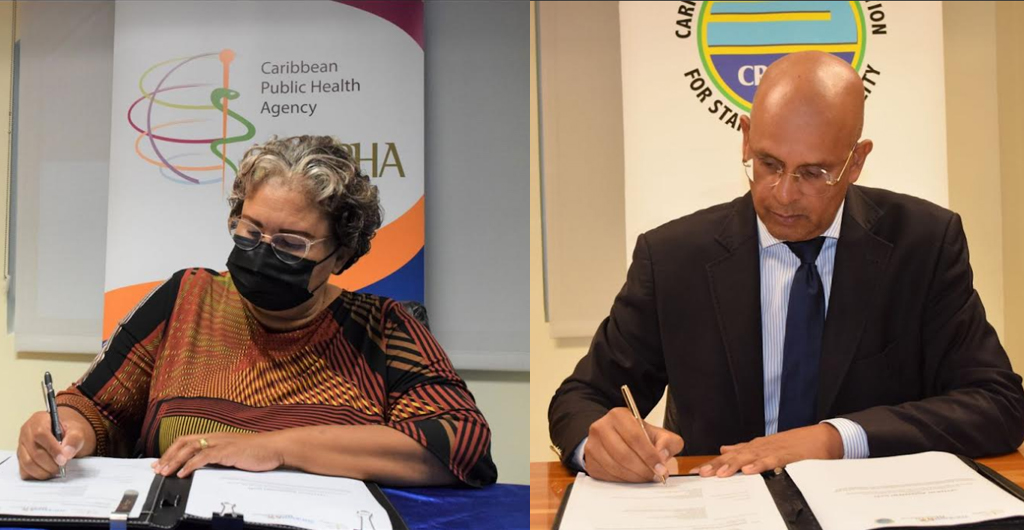Agreement between CARPHA and CROSQ signed for Caribbean-wide hospitality standards
Media Release – The health, safety and regional security of the Caribbean’s economies are closely related to the health of its tourism industry given that the Caribbean sub-region is the most tourism-dependent region of the world. The tourism sector has historically been one of the industries hardest hit by pandemics and crises, and is vulnerable to health, safety, and environmental sanitation (HSE) threats, challenging the sustainability of Caribbean tourism.
A new partnership between the Caribbean Public Health Agency (CARPHA) and the CARICOM Regional Organisation for Standards and Quality (CROSQ) will seek to develop and implement Caribbean-wide health, safety and environmental sanitation (HSE) hospitality operational standards.
The Letter of Agreement was signed on Thursday 3rd March 2022 by Dr. Joy St. John, CARPHA Executive Director, and Mr. Deryck Omar, CROSQ Chief Executive Officer, at CROSQ’s headquarters in Barbados.
“The adverse impact of HSE issues faced by the Caribbean tourism industry can largely be prevented through industry-wide adoption and implementation of standards-based, quality improvement approaches”, adding that “training in enhanced food and environmental safety, hospitality-based health monitoring and response systems, policy and public/private health and tourism partnerships is needed,” stated Dr. St. John.
There are no currently established regional travel and tourism quality assurance measures that are based on regional standards for food safety and sanitation, or best practices in sewage treatment, energy management, waste management, pest management and water treatment.
CARPHA, through its Regional Tourism and Health Program (THP) is working with CROSQ to develop and implement a core set of seven Caribbean wide-HSE quality standards for the tourism industry. The development and implementation of these standards would protect the Region’s fragile environment and lead to a safer and better-quality environmental product and standards-based destination, increasing the comparative advantage of Caribbean Tourism. These Standards were recently approved by the CARICOM Council for Trade and Economic Development Ministers at their November 2021 meeting.
“CROSQ has long promoted the value of quality services in our region. With the advent of the pandemic, standards and quality measures have become even more critical to our survival and resilience, especially for sectors like tourism and health. These seven standards, developed through regional consensus, have been diligently worked on with CARPHA’s THP, over the past two years. This agreement today, will allow us to do even more to recognize and implement quality into these sectors, which for many of our countries is key to future trade and economic growth,” said CROSQ CEO, Mr. Omar.
CARPHA and the CROSQ are both committed to a travel and tourism product that is safe, secure, and provides a quality and authentic experience to travellers to the Region.
Background information
CARPHA, through its Regional Tourism and Health Program (THP) is working with CROSQ to develop and implement the set of Caribbean-wide Health, Safety and Environmental, Sanitation, and Hospitality Standards and Quality Assurance and Recognition Framework to improve health, safety and environmental quality in the hospitality sector. The following seven quality standards have been developed and recently finalised, accompanying quality assurance and recognition programmes to come in due course:
- Food Safety and Sanitation for the Tourism Industry;
- Energy Management and Efficiency for the Tourism Industry;
- Water Treatment, Management and Efficiency for the Tourism Industry;
- Sewage Treatment and Management for the Tourism Industry;
- Solid Waste Management for the Tourism Industry;
- Integrated Pest Management for the Tourism Industry; and
- Environmental Management Systems for the Tourism Industry
In 2016, CARPHA and the Inter-American Development Bank (IDB) signed a Letter of Agreement entitled ‘Regional Tourism Health Information, Monitoring and Response Systems and Standards (THMRS) to Enhance Sustainable Tourism’ in six countries: The Bahamas, Barbados, Belize, Guyana, Jamaica, and Trinidad and Tobago. Phase I of this project sought to improve countries’ capacity to provide cost-effective and quality health, food safety and environmental sanitation solutions to Health, Safety and Environmental Sanitation (HSE) threats impacting sustainable tourism in the Caribbean. The project was extended in 2019 to include Phase II – to improve the capacity of the participating countries to fully operationalize and sustain the implementation of the THMRS. This includes a component for the design and rollout of Caribbean-specific Health, Safety and Environmental Standards. More about the Hospitality Health Safety and Environmental Sanitation Standards.
The European Union (EU) has committed 4.5 million euros to the Technical Barriers to Trade (TBT) Component of the 11th EDF-TBT Programme, which is implemented by the CARICOM Regional Organisation for Standards and Quality (CROSQ) and the Dominican Republic’s Institute for Quality (INDOCAL). The goals of the programme are to close the quality-related gaps that are identified in key sectors and organisations; promote the definition, relevance and application of quality infrastructure to key stakeholders throughout CARIFORUM, and, to strengthen regional frameworks in the quality areas of standards development, metrology, accreditation, conformity assessment and awareness. The TBT Component is expected to fund a feasibility study for developing an appropriate regional standards quality assurance programme.



